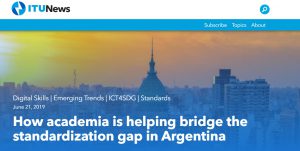How academia is helping bridge the standardization gap in Argentina
How academia is helping bridge the standardization gap in Argentina
By ITU News

Developing international information and communication technology (ICT)
standards is a foundational pillar of ITU‟s mission. ITU standards offer a common
basis for growth and innovation, and thereby accelerate progress towards the
United Nations Sustainable Development Goals. They enable interoperability,
economies of scale and grant access to global markets. They create opportunities
enjoyed by small and bigger market players.
ITU‟s Bridging the Standardization Gap programme facilitates the participation of
developing countries in ITU‟s standards-making process, empowers local experts
in the standardization process at the national, regional and international levels, and
promotes the implementation of international standards in developing countries.
But how can academia help spur more participation in ITU work in order to „bridge
the standardization gap‟ between developed and developing countries?
ITU News recently caught up with Héctor Mario Carril, Vice Chairman of ITU-T
Study Group 20 on IoT and Smart Cities and Communities, to discuss this topic.
Mr Carril is the creator and teacher of the course “International ICT Organizations”
at Argentina‟s National Technological University and is a member of the Impact of
Technologies in the Environment Group at the National University of La Plata. He
explained the goals of the course and plans to provide the training more widely.
What are the course’s main components? How is it unique?
The course is known as “International ICT Organizations” and addresses a
comprehensive knowledge of international organizations specialized in ICTs, with
focus on the ITU and standardization processes.
The contents and activities of the course point to the training of ICT professionals,
attentive to the requirements of the field of politics and international relations.
The course intends to answer several questions, such as:
How have ICTs evolved and where they are going? What are the principles
that govern that evolution?
What is a technical standard and how is it elaborated? How standards are
established?
Wat is a Recommendation?
How are international ICT organizations, especially the ITU, involved in the
development of the standards?
How are these organizations governed and operated?
The knowledge of these areas of supranational nature is fundamental for a
professional linked to the ICT sector, as it gives him or her tools to understand
international organizations‟ procedures, as well as to intervene in the development
of international standards, technical norms or regimes.
“We already have students, professionals and researchers
contributing to different ITU Groups and actively
participating in ITU Study Groups, developing reports,
guidelines and presenting contributions.”
Also, we should link the importance of studying these international organizations
with the participation that academia is beginning to have in the ITU, so that the
professionals will know its governance, procedures, structure, Study Groups, its
work in general – and its actions – in the region.
What we believe makes this course unique is that no other course introduces
students and professionals into the ITU world in this way. It‟s also unique because
this increases their interest in ITU as well as gives them a better understanding
when they start attending ITU Study Groups, not only studying old standards, but
how to be part of the development of future standards.
Why did you start the course and what are its main goals?
The course has its origin in the project “Argentine Universities in the ITU” which
started in 2014 and was awarded by the WSIS Forum 2016.
One of the concerns we‟ve identified that inspired the project, and then the course,
was the infinity of standards that are the basis for the development of a number of
services, equipment, applications and systems linked to the field of ICT.
“The main goal of the course is to generate skills in the
development of international standards that will help to
bridge the standardization gap in our country and in our
region.”
These standards are taken into account by those who are engaged in carrying out
these developments – by the technical community, by governments, by academia,
by the private sector and even by the civil society. However, we‟ve realized that
few people know the origin of those standards that are used as a guide to carry out
any of the tasks mentioned above. In general, the standards are accepted without
inquiring about their origin or their creation process.
For this reason, we thought it was necessary to train future professionals in
understanding the ITU and in the knowledge for developing standards.
The main goal of the course is to generate skills in the development of international
standards that will help to bridge the standardization gap in our country and in our
region.
What are the key benefits for students? How do you measure success?
Addressing issues that reflect directly the use and development of technology, the
interaction with other stakeholders at a supranational level, offers students a
different perspective that adds to their professional life.
“Even though, for the time being, the course has only
been taught in Argentina, we think it could be easily
exported to the rest of the Americas Region.”
On the other hand, students end up knowing how international standards are
developed and take a great advantage by participating in discussions and analysis
about the most relevant international current and future regimes.
One way to measure success and to reinforce the commitment with teaching about
international ICT organizations is when you see that students enroll in a course
even though it is not mandatory within their career.
Another way may be when we see that the number of students starting to
participate in research teams that develop activities in the ITU, after having taken
the course, increases. This also contributes to one of our main objectives, which is
to Bridge the Standardization Gap.
How do you see this course boosting participation of Argentina – and other
developing countries – in the work of ITU?
Universidad Tecnológica Nacional from Argentina has already incorporated the
course as optional in its curricula, for the third academic year, under the name “ITU
and other International ICT Organizations”; and also Universidad de Buenos Aires,
from Argentina, has approved it as a Postgraduate Course.
“We are convinced that developing countries could start
to bridge the standardization gap if they promote an
active participation of Academia in the ITU and in other
international ICT organizations as well.”
We already have students, professionals and researchers contributing to different
ITU Groups and actively participating in ITU Study Groups, developing reports,
guidelines and presenting contributions.
As an example, the GiCom research group from Universidad Tecnológica
Nacional, has a rapporteur and three editors of ITU-T standards in Study Group 20.
And all of them had previously attended the course.
Even though, for the time being, the course has only been taught in Argentina, we
think it could be easily exported to the rest of the Americas Region. It could be
delivered remotely, its modules can be adapted and reordered, and we can work on
an English version to be exported to other regions.
What are the next steps to scale this so that more countries can benefit?
We are convinced that developing countries could start to bridge the
standardization gap if they promote an active participation of Academia in the ITU
and in other international ICT organizations as well.
The main aim of this course is to be delivered, at least, in one university per
developing country and, in particular, in Latin America.
All relevant information, including contents, teachers and contacts can be found
in: www.organismosinternacionalestic.com.ar
We are ready to collaborate with those interested in joining this project to generate
capacities in ICT and to contribute to the work in ITU, not only to bridge the
standardization gap, but to contribute to achieve the UN Sustainable Development
Goals.
 Héctor Mario Carril is the creator and
Héctor Mario Carril is the creator and
teacher of the course “International ICT
Organizations” at Argentina‟s National
Technological University, a member of the
Impact of Technologies in the Environment
Group at the National University of La Plata
and Vice Chairman of ITU-T Study Group
20, IoT and Smart Cities and Communities
Leave a Reply